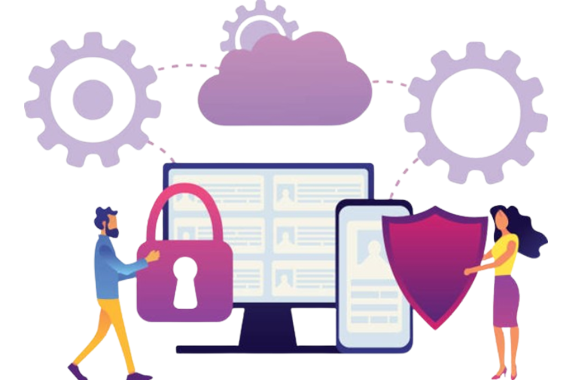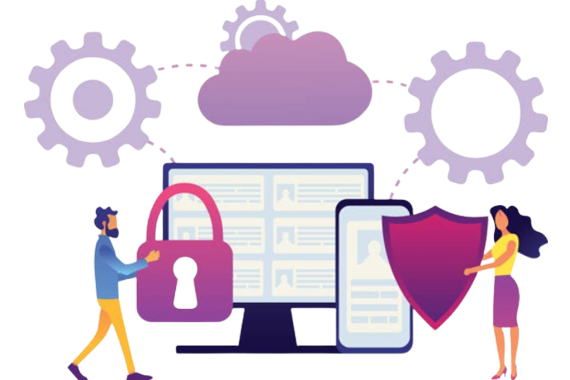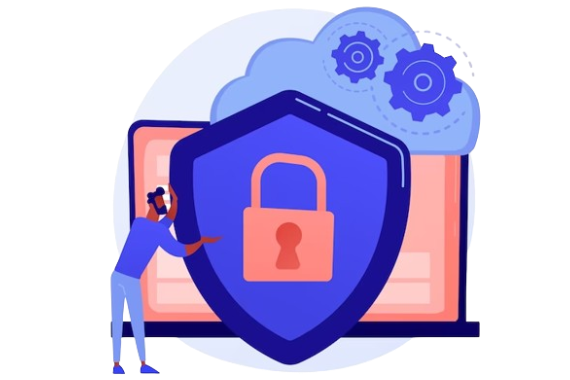Security & Compilance
Security and compliance are two fundamental pillars of the modern business landscape.
Security: Protecting sensitive data and systems is crucial in an age where cyber threats loom large. Robust security measures, such as firewalls, encryption, and multi-factor authentication, are essential to thwart cyberattacks. Regular security audits and proactive threat detection help organizations stay ahead in the cybersecurity arms race.
Compliance: Regulatory requirements are increasing in complexity and scope. Adherence to industry-specific standards, such as GDPR, HIPAA, or SOX, is not just a legal obligation but also a trust-building exercise with customers. Compliance frameworks ensure data privacy, financial transparency, and ethical business practices.
Balancing security and compliance is a delicate act. Effective security often aids compliance, but compliance doesn't guarantee security. Therefore, businesses need a comprehensive strategy that aligns both, safeguarding sensitive information while adhering to legal and industry-specific mandates. This not only mitigates risks but also fosters trust among stakeholders.


Identity and Access Management
Identity and Access Management (IAM) is the linchpin of modern security and compliance strategies. By ensuring that only authorized individuals gain access to sensitive data and resources, IAM safeguards organizations from cyber threats and maintains regulatory adherence. Robust IAM systems, like Azure Active Directory and Okta, streamline user authentication, authorization, and identity verification processes. These solutions enable businesses to enforce strict access policies, implement multi-factor authentication, and monitor user activities in real time. By managing user identities and access rights efficiently, IAM strengthens security postures, mitigates data breaches, and ensures compliance with stringent regulatory standards, offering peace of mind in today's digital landscape.
Cloud Security
Cloud Security stands as a cornerstone in safeguarding digital assets and ensuring compliance in the modern era. Leveraging advanced encryption, firewalls, and intrusion detection systems, cloud providers like Amazon Web Services, Azure, and Google Cloud offer robust protection against cyber threats. These security measures extend to data centers, networks, and applications, ensuring a holistic defense. Cloud Security also facilitates compliance adherence, meeting regulatory requirements such as GDPR, HIPAA, and PCI DSS. Regular security audits, real-time monitoring, and automated threat response bolster cloud security strategies, providing businesses with a fortified digital environment. Embracing Cloud Security guarantees data integrity, confidentiality, and regulatory compliance, building trust in the digital realm.


Endpoint Security
Endpoint Security, a critical component of modern cybersecurity strategies, focuses on protecting individual devices like computers, smartphones, and tablets from cyber threats. Advanced endpoint security solutions, such as antivirus software, firewalls, and threat intelligence tools, safeguard endpoints from malware, phishing attacks, and unauthorized access. Endpoint Security ensures data integrity, confidentiality, and availability, mitigating risks associated with evolving cyber threats. Additionally, compliance requirements, including data protection laws, mandate robust endpoint security measures. With features like real-time threat detection, automated patch management, and device encryption, Endpoint Security solutions offer comprehensive protection, fortifying organizations against cyber-attacks and ensuring compliance with stringent regulatory standards.
Security Management
Security Management is pivotal in safeguarding digital assets, ensuring data privacy, and maintaining regulatory compliance. It involves implementing comprehensive security protocols, risk assessments, and incident response strategies. Advanced security management solutions employ tools like Security Information and Event Management (SIEM) systems, intrusion detection systems, and encryption technologies. These tools enable real-time threat monitoring, data analysis, and automated response mechanisms, bolstering cybersecurity postures. Security Management also ensures adherence to industry regulations such as GDPR, HIPAA, and PCI DSS, mitigating legal and financial risks. By proactively managing security measures, organizations bolster their defenses, protect sensitive data, and build a robust compliance framework, fostering trust among stakeholders and clients.


Information Protection
Information Protection is paramount in the digital age, safeguarding sensitive data from unauthorized access and ensuring regulatory compliance. Robust information protection strategies involve encryption, access control, and data classification, shielding vital assets from cyber threats. Utilizing tools like Data Loss Prevention (DLP) software, organizations can monitor, detect, and prevent unauthorized data sharing, enhancing confidentiality. Compliance mandates, such as HIPAA and GDPR, necessitate stringent information protection measures, compelling businesses to invest in secure data storage and transmission practices. Information Protection not only safeguards intellectual property but also fosters customer trust, ensuring that sensitive information remains confidential, integral, and accessible only to authorized personnel, thereby bolstering cybersecurity and regulatory adherence.
Threat Protection
Threat Protection is at the forefront of cybersecurity, defending organizations against ever-evolving malicious attacks. This proactive approach involves deploying sophisticated tools, like antivirus software, firewalls, and intrusion detection systems, to identify, mitigate, and neutralize cyber threats. Threat Protection strategies also encompass threat intelligence, behavioral analysis, and real-time monitoring, ensuring early detection of anomalies and potential breaches. By leveraging machine learning and AI-driven algorithms, businesses can predict and counteract sophisticated threats. Compliance standards, such as PCI DSS and ISO 27001, mandate robust threat protection measures, underscoring the importance of proactive defense. Effective Threat Protection not only safeguards sensitive data but also preserves business continuity, trust, and reputation, making it indispensable in today's digital landscape.

